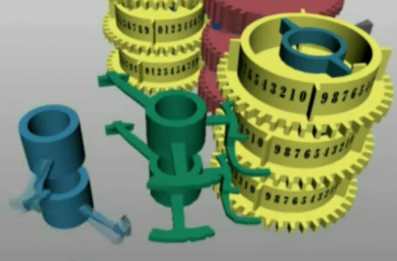As a follow up to this post about the Babbage Analytical Engine, here is an article and TEDx video about the project to finally build this master piece.
Another article on the same topic.
There have been proposals to emulate or simulate the logic of the Analytical Engine in either an FPGA or even in micro-scale components. All worthy causes.
Wednesday, May 2, 2012
Another Beginning of Infinity quote
As a follow on to this blog post, here is another quote from The Beginning of Infinity:
 The concept is that memes encode ideas and knowledge (something David Deutsch stresses throughout the chapter "The Evolution of Culture"), and like their DNA counterparts, memes can change, ie evolve. And they evolve much faster than genes. Some memes such as social norms may evolve on the scale of a normal lifetime, other memes (especially internet memes) may evolve of the course of days, if not hours.
The concept is that memes encode ideas and knowledge (something David Deutsch stresses throughout the chapter "The Evolution of Culture"), and like their DNA counterparts, memes can change, ie evolve. And they evolve much faster than genes. Some memes such as social norms may evolve on the scale of a normal lifetime, other memes (especially internet memes) may evolve of the course of days, if not hours.
The question of 'are humans still evolving' is being debated (this article seems to indicate that there is evidence of human evolution as late as the 19th century). While this is an interesting question, I'm not sure it is an important one. Knowledge transmission via DNA is no longer the main method of human evolution, rather, it is via memes: a much faster, more flexible method of transmitting information.
DNA is method of creating knowledge and transmitting it to the future, while on the one hand very flexible (the variety of life on this planet is simply amazing), on the other, it is inflexible in that it is undirected and slow. The 'knowledge' stored in DNA describes an organism, that is, in theory well suited to a specific environment, in order to replicate the DNA itself. However, that knowledge may be out of date if the environment changes

So, over the course of millions of years, chemical knowledge, storage, and transmission has lead to an organism that is capable of a different type of information storage and transmission- culture, education, writing systems, etc. Now, this organism has embarked on another level of abstraction: digital information processing. Vernor Vinge has an essay well worth reading, "The Coming Technological Singularity: How to Survive in the Post-Human Era" The abstract from this essay:
Within thirty years, we will have the technological
means to create superhuman intelligence. Shortly after,
the human era will be ended.
Is such progress avoidable? If not to be avoided, can
events be guided so that we may survive? These questions
are investigated. Some possible answers (and some further
dangers) are presented.
Are we at an inflection point, as Vernor Vinge suggests? For millions of years, information was stored and transmitted in chemical units, genes. These genes created an organism that, for the first time, has overcome the limitations of chemical storage. We are capable of creating, changing, and transmitting knowledge independent of the slower, more rigid chemical means. In fact, we are even communicating (both intentionally and unintentionally) with Deep Time.
It took millions of years to make the jump from chemical to cultural evolution. Will we ever make the jump from cultural to silicon based digital evolution? I don't know if we'll ever make a self-aware artificial life form, something that can pass the Turning Test, but I'm fairly certain we'll be able to make 'things' that can independently create, improve, store, and transmit knowledge.
Biological evolution was merely a finite preface to the main story of evolution, the unbounded evolution of memes.As, like the first quote, this one got me thinking. First, a definition of meme: a meme is a item of culture that is passed from person to person, group to group, society to society, generation to generation. Memes can be jokes, ideas, conventions, cultural behavior, etc. The term was first used by Richard Dawkins in the 1976 book The Selfish Gene, though the concept predates that.
 The concept is that memes encode ideas and knowledge (something David Deutsch stresses throughout the chapter "The Evolution of Culture"), and like their DNA counterparts, memes can change, ie evolve. And they evolve much faster than genes. Some memes such as social norms may evolve on the scale of a normal lifetime, other memes (especially internet memes) may evolve of the course of days, if not hours.
The concept is that memes encode ideas and knowledge (something David Deutsch stresses throughout the chapter "The Evolution of Culture"), and like their DNA counterparts, memes can change, ie evolve. And they evolve much faster than genes. Some memes such as social norms may evolve on the scale of a normal lifetime, other memes (especially internet memes) may evolve of the course of days, if not hours.The question of 'are humans still evolving' is being debated (this article seems to indicate that there is evidence of human evolution as late as the 19th century). While this is an interesting question, I'm not sure it is an important one. Knowledge transmission via DNA is no longer the main method of human evolution, rather, it is via memes: a much faster, more flexible method of transmitting information.
DNA is method of creating knowledge and transmitting it to the future, while on the one hand very flexible (the variety of life on this planet is simply amazing), on the other, it is inflexible in that it is undirected and slow. The 'knowledge' stored in DNA describes an organism, that is, in theory well suited to a specific environment, in order to replicate the DNA itself. However, that knowledge may be out of date if the environment changes

So, over the course of millions of years, chemical knowledge, storage, and transmission has lead to an organism that is capable of a different type of information storage and transmission- culture, education, writing systems, etc. Now, this organism has embarked on another level of abstraction: digital information processing. Vernor Vinge has an essay well worth reading, "The Coming Technological Singularity: How to Survive in the Post-Human Era" The abstract from this essay:
Within thirty years, we will have the technological
means to create superhuman intelligence. Shortly after,
the human era will be ended.
Is such progress avoidable? If not to be avoided, can
events be guided so that we may survive? These questions
are investigated. Some possible answers (and some further
dangers) are presented.
Are we at an inflection point, as Vernor Vinge suggests? For millions of years, information was stored and transmitted in chemical units, genes. These genes created an organism that, for the first time, has overcome the limitations of chemical storage. We are capable of creating, changing, and transmitting knowledge independent of the slower, more rigid chemical means. In fact, we are even communicating (both intentionally and unintentionally) with Deep Time.
It took millions of years to make the jump from chemical to cultural evolution. Will we ever make the jump from cultural to silicon based digital evolution? I don't know if we'll ever make a self-aware artificial life form, something that can pass the Turning Test, but I'm fairly certain we'll be able to make 'things' that can independently create, improve, store, and transmit knowledge.
Thursday, April 26, 2012
Hakkōda Mountains
Rumor has it that this is a hidden gem for deep powder. The Hakkōda Mountains are in the Aomori Prefecture of Northeastern Japan.
 |
| photo from aotown's Panoramio page |
Saturday, April 14, 2012
Visually Documenting the Space Shuttle Program
Apologies if this is a re-post, but I couldn't find it in my history. This is a video put together by the folks who are responsible for documenting the space shuttle program. Not only does the video contain amazing still & moving pictures, but these guys go into detail on how they are able to get such amazing shots.
This is well worth the full 45 minutes, especially in HD
This is well worth the full 45 minutes, especially in HD
Thursday, April 5, 2012
Geeks rule!
 When faced with a typical childhood problem (toys that don't work as designed or work with each other), this dad fixed the problem by building a 3-D printer. The result: a universal connection kit which allows toys of all sorts to work together. Long live geeks & problem solvers!
When faced with a typical childhood problem (toys that don't work as designed or work with each other), this dad fixed the problem by building a 3-D printer. The result: a universal connection kit which allows toys of all sorts to work together. Long live geeks & problem solvers!
Tuesday, April 3, 2012
AT&T Femtocell security
The folks over at fail0verflow :: havea great article on the internals and security of an AT&T femtocell. Time to check eBay to see if I'm getting a new toy!
Why does Java suck so much?
I know, a rhetorical question. But how did this ever make it out of the role of playing games on cell phones?
Subscribe to:
Posts (Atom)




